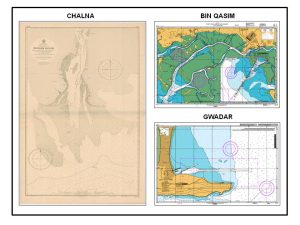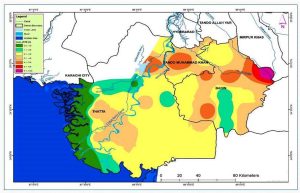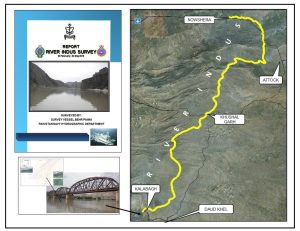Territorial Waters and Maritime Zones Act, 1976 (of 22 December 1976)
Short title and commencement 1. (1) This Act may be called the Territorial Waters and Maritime Zones Act, 1976. (2) It shall come into force at once. Territorial waters 2. (1) The sovereignty of Pakistan extends and has always extended to the territorial waters of Pakistan, hereinafter referred to as the territorial waters, as well as to the airspace over, and the bed and subsoil of such waters. (2) The limit of the territorial waters is 12 nautical miles beyond the land territory and internal waters of Pakistan measured from the baseline. (3) The baseline from which such limit shall be measured and the waters on the landward side of which shall form part of the internal waters of Pakistan shall be specified by the Federal Government by notification in the official Gazette. (4) Where a single island, rock or a composite group thereof constituting a part of the territory of Pakistan is situated off the main coast, the baseline referred to in subsection (3) shall be drawn along the outer seaward limits of such island, rock or composite group. Use of territorial waters by foreign ships 3. (1) Without prejudice to the provisions of any other law for the time being in force and subject to the provisions of subsection (2) and subsection (3), all foreign ships shall enjoy the right of innocent passage through the territorial waters. Explanation. For the purposes of this section, passage is innocent so long as it is not prejudicial to the peace, good order or security of Pakistan. (2) Foreign warships, including submarines and other underwater vehicles and foreign military aircraft may enter or pass through the territorial waters and the airspace over such waters with the prior permission of the Federal Government; Provided that submarines and other underwater vehicles shall navigate on the surface and show their flag while passing through such waters. (3) Foreign supertankers, nuclear-powered ships and ships carrying nuclear or other inherently dangerous or noxious substances or materials may enter or pass through the territorial waters after giving prior notice to the Federal Government. (4) The Federal Government may, if satisfied that it is necessary so to do in the interest of the peace, good order or security of Pakistan or any part thereof, suspend, by notification in the official Gazette, subject to such exceptions and qualifications, if any, as may be specified in the notification, the entry of all or any class of foreign ships into such area of the territorial waters as may be specified in the notification. Page 2 National legislation – DOALOS/OLA – United Nations asdf Contiguous zone 4. (1) The contiguous zone of Pakistan, hereinafter referred to as the contiguous zone, is an area adjacent to and beyond the territorial waters and extending seaward to a line 24 nautical miles measured from the baseline declared under subsection (3) of section 2. (2) The Federal Government may exercise such powers and take such measures in or in respect of the contiguous zone as it may consider necessary to prevent and punish the contravention of, and an attempt to contravene, any law in force in Pakistan relating to: (a) The security of Pakistan; (b) Immigration and sanitation; and (c) Customs and other fiscal matters. (3) The Federal Government may, by notification in the official Gazette: (a) Extend to the contiguous zone any law relating to any matter referred to in clause (a) or clause (b) or clause (c) of subsection (2), for the time being in force in Pakistan or any part thereof, with such modifications, if any, as may be specified in the notification; and (b) Make such provisions as it may consider necessary for facilitating the enforcement of such law and any law so extended shall have effect as if the contiguous zone formed part of the territory of Pakistan. Continental Shelf 5. (1) The Continental Shelf of Pakistan, hereinafter referred to as the Continental Shelf, shall comprise the sea-bed and subsoil of the submarine areas that extend beyond the limit of the territorial waters of Pakistan throughout the natural prolongation of the land territory of Pakistan to the outer edge of the continental margin or where the outer edge of the continental margin does not extend up to a distance of 200 nautical miles from the baseline declared under subsection (3) of section 2, up to that distance. (2) Pakistan has, and always had, full and exclusive sovereign rights in respect of its Continental Shelf, including – (a) exclusive sovereign rights for the purpose of exploration, development, exploitation, conservation and management of all resources, both living and non-living; (b) exclusive rights and jurisdiction to authorize, regulate and control scientific research; (c) exclusive rights and jurisdiction for the construction, maintenance or operation of artificial islands, offshore terminals, installations and other structures and devices necessary for the exploration and exploitation of the resources of the Continental Shelf, for the convenience of shipping or for any other purpose; and (d) exclusive jurisdiction to preserve and protect the marine environment and to prevent and control marine pollution. (3) No person, including a foreign Government, shall, except under, and in accordance with the terms of, any agreement with the Federal Government or a licence or letter of authority granted by the Federal Government, explore the Continental Shelf or exploit is resources or carry out any search or excavation or conduct any research Page 3 National legislation – DOALOS/OLA – United Nations asdf within the Continental Shelf or drill therein or construct, maintain or operate therein for any purpose whatsoever any artificial islands, offshore terminal, installation or other structure or device. (4) The Federal Government may, by notification in the official Gazette – (a) declare any area of the Continental Shelf and its superjacent waters to be a designated area; and (b) make such provisions as it may deem necessary with respect to all or any of the following matters, namely – (i) the exploration, development, exploitation and protection of the resources of the Continental Shelf within such designated area; (ii) the safety and protection of artificial islands, offshore terminals, installations and other structures and devices in such designated area; (iii) the protection of marine environment of such designated area; (iv) customs and other fiscal matters in relation to such designated area; and (v) the regulation of entry into and passage through the designated area of foreign ships by the establishment of fairways, sealanes, traffic separation schemes or any other mode of ensuring freedom of navigation which is not prejudicial to the interests of Pakistan. (5) The Federal Government may, by notification in the official Gazette – (a) extend to the whole or any part of the Continental Shelf any law for the time being in force in Pakistan or any part thereof, with such modifications, if any, as may be specified in the notification; and (b) make such provisions as it may consider necessary for facilitating the enforcement of such law; and any law so extended shall have effect as if the Continental Shelf or, as the case may be, the part thereof to which it has been extended formed part of the territory of Pakistan. (6) Subject to any measures that may be necessary for protecting the interests of Pakistan, and without prejudice to the provisions of subsection (2), the Federal Government may not impede the laying or maintenance of submarine cables or pipelines on the sea-bed of the Continental Shelf by foreign States: Provided that the consent of the Federal Government shall be necessary for the delineation of the course for the laying of such cables or pipelines. … Exclusive Economic Zone 6. (1) In Exclusive Economic Zone of Pakistan, hereinafter referred to as the Exclusive Economic Zone, is an area beyond and adjacent to the territorial waters the limit of which is 200 nautical miles from the baseline declared under subsection (3) of section 2. (2) In the Exclusive Economic Zone, its bed and subsoil and the superjacent waters, Pakistan has – (a) exclusive sovereign rights for the purpose of exploration, development, exploitation, conservation and management of all resources, both living and non-living, as well as for producing energy from tides, winds, currents and the sun; (b) exclusive rights and jurisdiction for the construction, maintenance or operation of artificial islands, offshore terminals, installations and other structures and devices necessary for the exploration and exploitation of the resources of the Zone or for the convenience of shipping or for any other purpose; (c) exclusive rights and jurisdiction to authorize, regulate and control scientific research; (d) exclusive jurisdiction to preserve and protect the marine environment and to prevent and control marine pollution; and (e) such other rights as are recognized by international law. (3) No person, including a foreign Government, shall, except under, and in accordance with the terms of, any agreement with the Federal Government or a licence or letter of authority granted by the Federal Government, explore or explit any resources of the Exclusive Economic Zone or carry out any search or excavation or conduct any research within the Exclusive Economic Zone or drill therein or construct, maintain or operate therein for any purpose whatsoever any artificial island, offshore terminal, installation or other structure or device: Provided that fishing in the Exclusive Economic Zone shall be regulated by the provisions of the Exclusive Fishery Zone (Regulation of Fishing) Act, 1975 (XXII of 1975). (4) The Federal Government may, by notification in the official Gazette – (a) declare any area of the Exclusive Economic zone to be a designated area; and (b) make such provisions as it may deem necessary with respect to all or any of the following matters, namely – (i) the exploration, development, exploitation and protection of the resources of such designated area; (ii) other activities for the economic exploitation and exploration of such designated area, such as the production of energy from tides, winds, currents and the sun; (iii) the safety and protection of artificial islands, offshore terminals, installation and other structures and devices in such designated area; (iv) the protection of marine environment of such designated area; (v) customs and other fiscal matters in relation to such designated areas; and (vi) the regulation of entry into and passage through the designated area of foreign ships by the establishment of fairways, sealanes, traffic separation schemes or any other mode of ensuring freedom of navigation which is not prejudicial to the interest of Pakistan. (5) The Federal Government may, by notification in the official Gazette – (a) extend to the whole or any part of the Exclusive Economic Zone any law for the time being in force of Pakistan of any part thereof subject to such modifications as may be specified in the notification; and (b) make such provisions as it may consider necessary for facilitating the enforcement of such law, and any law so extended shall have effect as if the Exclusive Economic Zone or, as the case may be, the part thereof to which it has been extended formed part of the territory of Pakistan. Page 5 National legislation – DOALOS/OLA – United Nations asdf (6) The provisions of subsection (6) of section 5 shall apply in relation to the laying or maintenance of submarine cables or pipelines on the seabed of the Exclusive Economic Zone as they apply in relation to the laying or maintenance of submarine cables or pipelines on the seabed of the Continental Shelf. (7) In the Exclusive Economic Zone and the air space over the Zone, ships and aircraft of all States shall, subject to the exercise by Pakistan of its rights within the Zone, enjoy freedom of navigation and overflight. … Historic waters 7. (1) The Federal Government may, by notification in the official Gazette, specify the limits of such waters adjacent to its land territory as are the historic waters of Pakistan. (2) The sovereignty of Pakistan extends, and has always extended, to the historic waters of Pakistan and to the seabed and subsoil underlying, and the airspace over, such waters. Maritime boundaries between Pakistan and States having coasts opposite or adjacent to those of Pakistan 8. (1) Notwithstanding anything contained in any other provision of this Act: (a) The delimitation of the territorial waters between Pakistan and any other State whose coast is opposite or adjacent to that of Pakistan shall be determined by agreement between Pakistan and such State and pending such agreement and, unless any other provisional arrangements are agreed to between them, the boundary with regard to the territorial waters between Pakistan and such State shall not extend beyond the line every point of which is equidistant from the baseline from which the breadth of the territorial waters of Pakistan and of such State is measured; and (b) the delimitation of the Contiguous Zone, the Continental Shelf, the Exclusive Economic Zone and other maritime zones between Pakistan and any other State whose coast is opposite or adjacent to that of Pakistan shall be effected by agreement in accordance with equitable principles and taking account of all the relevant circumstances, and pending such agreement or a settlement Pakistan and such State shall make provisional arrangements taking into account the said principles for delimitation of the Contiguous Zone, the Continental Shelf, the Exclusive Economic Zone and other maritime zones. (2) Every agreement referred to in clauses (a) and (b) of subsection (1) shall, as soon as may be after it is entered into, be published in the official Gazette. Publication of charts 9. The Federal Government may cause the baseline referred to in sub-section (3) of section 2, the limits of the Territorial Waters, the Contiguous Zone, the Continental Shelf and the Exclusive Economic Zone and the maritime boundaries as settled by agreements referred to in section 8 to be published in charts. Offences 10. Whoever contravenes any provision of this Act or of any rule or notification made or issued thereunder shall, without prejudice to any other action which may be taken against such person under any other provision of this or of any other law, be punishable with imprisonment for a term which may extend to three years, or with fine, or with both. Page 6 National legislation – DOALOS/OLA – United Nations asdf Offences by companies 11. (1) Where an offence punishable under section 10 has been committed by a company, every person who, at the time the offence was committed, was in charge of, and was responsible to the company for, the conduct of the business of the company, as well as the company, shall be deemed to be guilty of the offence and shall be liable to be proceeded against and punishable accordingly: Provided that nothing contained in this subsection shall render any such person liable to any punishment provided in this Act if he proves that the offence was committed without his knowledge or that he exercised all due diligence to prevent the commission of such offence. (2) Notwithstanding anything contained in subsection (1), where an offence punishable under section 10 has been committed by a company and it is proved that the offence has been committed with the consent or connivance of, or is attributable to any neglect on the part of, any director, manager, secretary or other officer of the company, such director, manager, secretary or other officer shall also be deemed to be guilty of that offence and shall be liable to be proceeded against and punished accordingly. Explanation. For the purpose of this section – (a) “company” means any body corporate and includes a firm or other association of individuals; and (b) “director”, in relation to a firm, means a partner in the firm. Place of trial 12. Any person committing an offence punishable under section 10 or under any of the laws extended under this Act may be tried for the offence in such place or places as the Federal Government may, by general or special order published in the official Gazette, direct in this behalf. Previous sanction of the Federal Government for prosecution 13. No prosecution shall be instituted against any person in respect of any offence punishable under section 10 or under any of the laws extended under this Act without the previous sanction of the Federal Government or such officer or authority as may be authorized by that Government by order in writing in this behalf. Power to make rules 14. (1) The Federal Government may, by notification in the official Gazette, make rules for carrying out the purposes of this Act. (2) In particular and without prejudice to the generality of the foregoing power, such rules may provide for all or any of the following matters, namely: (a) regulation of the conduct of any person in the Territorial Waters, the Contiguous Zone, the Continental Shelf, the Exclusive Economic Zone or any other maritime zone of Pakistan; (b) regulation of the exploration, development, exploitation, conservation and management of the resources of the Continental Shelf; (c) regulation of the exploration, development, exploitation, conservation and management of the resources of the Exclusive Economic Zone; Page 7 National legislation – DOALOS/OLA – United Nations asdf (d) regulation of the construction, maintenance and operation of artificial islands, offshore terminals, installations and other structures and devices referred to in section 5 and section 6; (e) preservation and protection of the marine environment and prevention and control of marine pollution; (f) authorization, regulation and control of the conduct of scientific research; (g) fees in relation to licences and letters of authority referred to in subsection (3) of section 5 and subsection (3) of section 6 or for any other purpose; or (h) any matter incidental to any of the matters specified in clauses (a) to (g).
Achievements of Pakistan Navy Hydrographic Department (PNHD) include ;
PNHD has contributed in blue economy through mapping to support safe navigation of merchant ships and maritime security operations. In addition, initial surveys and feasibility studies conducted by the department played vital role in site identification/development of ports at Bin Qasim, Gwadar, Ormara, Chalna (East Pakistan/Bangladesh before 1971) etc.
Seawater Intrusion (SWI) is a phenomenon which has significant effects on coastal ecosystem and infrastructure. Considering its importance the Federal Government approved a project in April 2020 to undertake in-depth analysis based on scientific observations and working out way forward. The project shall complete in 5 years’ time. National Institute of Oceanography is leading this project whereas PNHD is a member of this national level project for sharing relevant expert opinion and supporting field observations.
IDENTIFICATION OF SITES FOR PORTS AND HARBOURS

SEA WATER INTRUSION PROJECT

PNHD and Inland Waterways
Apart from hydrographic surveys for charting, PNHD has conducted surveys for national coastal projects. In addition,PNHD has also conducted various inland surveys including survey of River Indus (Nowshera to DawoodKhel, Mianwali) to support studies for inland water transportation project.

Credit ; https://hydrography.paknavy.gov.pk/wp-content/uploads/2020/09/Pakistan-Maritime-Zones-Act-1976.pdf

Leave A Comment